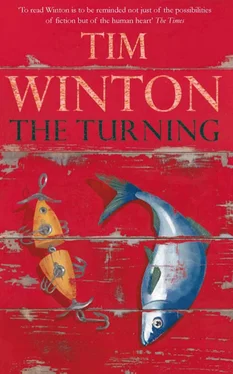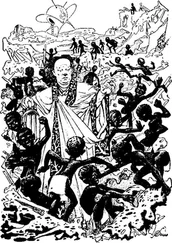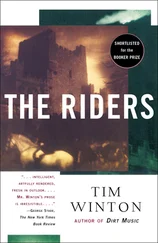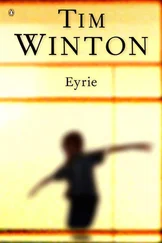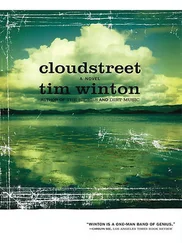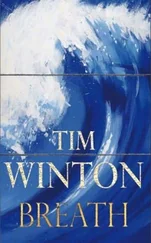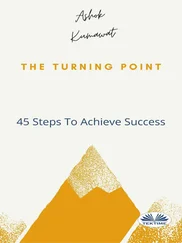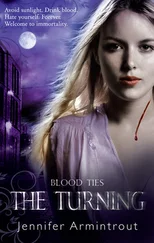The water table, he said in a chirpy accent. It’s high here, see. Half these fence posts are in it, you know.
The rank, dark stink of blood and bone hung in the air. I climbed back over the fence but kept watching him dig.
Looks dry this country, it does, but underground there’s water. Caves of it. Drilling, that’s what this country needs.
I went indoors.
Someone hung a snake from our jacaranda out front. It was a dugite, headless and oozing. My mother went spare.
Across the road one night, Mr Box left his kids asleep in the Holden and went indoors with his wife. It was for a moment’s peace, my oldies said, but a moment was all they had. The station wagon rolled across the road, bulldozed the letterbox and mowed down our roses.
George Mannering with the long feet trimmed his buffalo grass every week with a push mower. He liked grass; it was the one thing he’d not had in England though he reminded us that English grass was better, finer. My mother rolled her eyes. George Mannering bought a Victa power mower and I stood out front to watch his first cut. I was there when two-year-old Charlie lurched up between his father’s legs and lost some toes in a bright pink blur. All the way back inside to my room I heard his voice above the whine of the two-stroke which sputtered alone out there until the ambulance came.
I forget how old I was when I gave in and went to the swamp. It felt bad to be cheating on my parents but the wild beyond the fences and the lawns and sprinklers was too much for me. By this time I was beginning to have second thoughts about the 1194 man. My parents bought a kitchen clock which seemed to cheat with time. A minute was longer some days than others. An hour beyond the fence travelled differently across your skin compared with an hour of television. I felt time turn off. Time wasn’t straight and neither was the man with the BBC voice. I discovered that you could say anything you liked to him, shocking things you’d only say to prove a point, and the man never said a thing except declare the plodding time. I surrendered to the swamp without warning. Every wrinkle, every hollow in the landscape led to the hissing maze down there. It was December, I remember. I got off my bike and stepped down into dried lupins like a man striding through a crowd. Seed pods rattled behind me. A black swan rose from the water. I went on until the ground hardened with moisture and then went spongy with saturation. Scaly paper-barks keeled away in trains of black shadow. Reeds bristled like venetian blinds in the breeze. Black water bled from the ground with a linoleum gleam.
From the water’s edge you couldn’t even see our street. The crowns of tuart trees were all I saw those early years before jacarandas, flame trees, and cape lilacs found their way to water and rose from yards like flags. I found eggs in the reeds, skinks in a fallen log, a bluetongue lizard jawing at me with its hard scales shining amidst the sighing wild oats. I sat in the hot shade of a melaleuca in a daze.
After that I went back alone or in the company of the Box kids or even Bruno. We dug hideouts and lit fires, came upon snakes real and imagined. I trekked to the swamp’s farthest limits where the market gardens began. Italian men in ragged hats worked on sprinklers, lifted melons, turned the black earth. Water rose in rainbows across their land. I went home before dark, amazed that my parents still believed me when I swore solemnly that I hadn’t been down the swamp.
At school I learned about the wide brown land, the dry country. Summer after summer we recited the imperatives of water conservation. Sprinklers were banned in daylight hours and our parents watered glumly by hand.
One summer my mother announced that she’d come upon some Cape Coloureds at the nearest market garden. I thought she meant poultry of some kind. I met them on my own one day and was confused by their accents. We threw a ball for a while, two girls and me. Their skin had a mildness about it. They didn’t seem as angry as the Joneses. The Joneses were dark and loud. Even their laughter seemed angry. I never had much to do with any of them. I rode past their house careful not to provoke them. They gave my little brother a hiding once. I never knew why. His nose swelled like a turnip and he nursed this grievance for the rest of his life. It made his mind up about them, he said. I kept clear. I already had Alan Mannering to worry about.
The Joneses never went near the swamp. I heard they were frightened of the dark. Their dad worked in a mine. Bruno said vile things to them and bolted into the swamp for sanctuary. It was his favourite game the year Americans went to the moon.
One sunny winter day I sat in a hummock of soft weeds to stare at the tadpoles I had in my coffee jar. Billy Box said we all begin as tadpoles, that the Pope didn’t want us to waste even one of them. I fell asleep pondering this assertion and when I woke Alan Mannering stood over me, his face without expression. I said nothing. He looked around for a moment before pulling his dick out of his shorts and pissing over me. He didn’t wet me; he pissed around me in a huge circle. I saw sunlight in his pale stream and lay still lest I disturb his aim. When he was finished he reeled himself back into his shorts and walked off. I emptied my tadpoles back into the lake.
What did he want? What did he ever want from me?
I was ten when people started dumping cars down at the swamp. Wrecks would just appear, driven in the back way from behind the market gardens, stripped or burned, left near the water on soft ground where the dirt tracks gave out.
Alan Mannering was the first to hack the roof off a car and use it upturned as a canoe. That’s what kids said, though Bruno claimed it was his own idea.
I was with half a dozen Box kids when I saw Alan and Bruno out on the lake a hundred yards apart sculling along with fence pickets. Those Box kids crowded against me, straining, big and small, to see. I can still remember the smell of them pressed in like that, their scent of warm milk and wet sheets. The two bigger boys drifted in silhouette out on the ruffled water. One of the Boxes went back for their old man’s axe and we went to work on the scorched remains of an old FJ Holden with nasty green upholstery. One of them came upon a used condom. The entire Box posse was horrified. I had no idea what it was and figured that you needed to be a Catholic to understand. Before dark we had our roof on the water. We kept close to shore and quickly discovered that two passengers was all it could carry. Several Boxes went home wet. I doubt that anybody noticed. They were always wet.
Next day was Saturday. I got down to the swamp early in order to have the raft to myself a while and had only pulled it from its nest of reeds when Alan Mannering appeared beside me. He never said a word. I actually cannot remember that boy ever uttering a word meant for me. He lived over the road for ten years. He all but walked me home from school for five of those, poking me from behind, sometimes peppering my calves with gravel. I was in his house once, I remember the airless indoor smell. But he never spoke to me at any time.
Alan Mannering lifted the jarrah picket he’d ripped from someone’s fence and pressed the point of it into my chest. I tried to bat it away but he managed to twist it into my shirt and catch the flesh beneath so that I yielded a few steps. He stepped toward me casually, his downy legs graceful.
You’re shit, I said, surprising myself.
Alan Mannering smiled. I saw cavities in his teeth and a hot rush of gratitude burned my cheeks, my fingertips. Somehow the glimpse of his teeth made it bearable to see him drag our FJ Holden roof to the water and pole out into the shimmering distance without even a growl of triumph, let alone a word. I lifted my tee-shirt to inspect the little graze on my chest and when I looked up again he was in trouble.
Читать дальше
